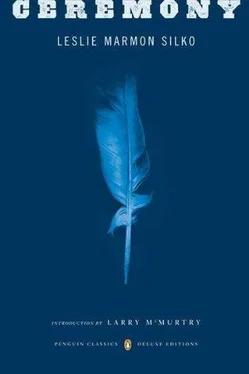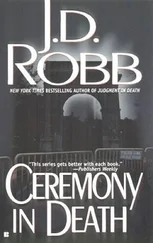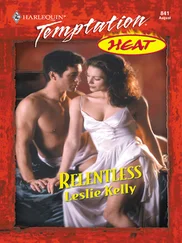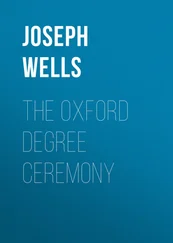He bent down like the old man did when he passed through the low doorway. Currents of cool air streamed toward the door, and even before his eyes adjusted to the dimness of the room, he could smell its contents; a great variety of herb and root odors were almost hidden by the smell of mountain sage and something as ordinary as curry powder. Behind the smell of dried desert tea he smelled heavier objects: the salty cured smell of old hides sewn into boxes bound in brass; the odor of old newspapers and cardboard, their dust smelling of the years they had taken to decay.
The old man pointed to the back of the circular room. “The west side is built into the hill in the old-style way. Sand and dirt for a roof; just about halfway underground. You can feel it, can’t you?”
Tayo nodded. He was standing with his feet in the bright circle of sunlight below the center of the log ceiling open for smoke. The size of the room had not been lost in the clutter of boxes and trunks stacked almost to the ceiling beams.
Old Betonie pointed at a woolly brown goatskin on the floor below the sky hole. Tayo sat down, but he didn’t take his eyes off the cardboard boxes that filled the big room; the sides of some boxes were broken down, sagging over with old clothing and rags spilling out; others were jammed with the antennas of dry roots and reddish willow twigs tied in neat bundles with old cotton strings. The boxes were stacked crookedly, some stacks leaning into others, with only their opposing angles holding them steady. Inside the boxes without lids, the erect brown string handles of shopping bags poked out; piled to the tops of the WOOLWORTH bags were bouquets of dried sage and the brown leaves of mountain tobacco wrapped in swaths of silvery unspun wool.
He could see bundles of newspapers, their edges curled stiff and brown, barricading piles of telephone books with the years scattered among cities — St. Louis, Seattle, New York, Oakland — and he began to feel another dimension to the old man’s room. His heart beat faster, and he felt the blood draining from his legs. He knew the answer before he could shape the question. Light from the door worked paths through the thick bluish green glass of the Coke bottles; his eyes followed the light until he was dizzy and sick. He wanted to dismiss all of it as an old man’s rubbish, debris that had fallen out of the years, but the boxes and trunks, the bundles and stacks were plainly part of the pattern: they followed the concentric shadows of the room.
The old man smiled. His teeth were big and white. “Take it easy,” he said, “don’t try to see everything all at once.” He laughed. “We’ve been gathering these things for a long time — hundreds of years. She was doing it before I was born, and he was working before she came. And on and on back down in time.” He stopped, smiling. “Talking like this is just as bad, isn’t it? Too big to swallow all at once.”
Tayo nodded, but now his eyes were on the ceiling logs where pouches and bags dangled from wooden pegs and square-headed nails. Hard shrunken skin pouches and black leather purses trimmed with hammered silver buttons were things he could understand. They were a medicine man’s paraphernalia, laid beside the painted gourd rattles and deer-hoof clackers of the ceremony. But with this old man it did not end there; under the medicine bags and bundles of rawhide on the walls, he saw layers of old calendars, the sequences of years confused and lost as if occasionally the oldest calendars had fallen or been taken out from under the others and then had been replaced on top of the most recent years. A few showed January, as if the months on the underlying pages had no longer been turned or torn away.
Old Betonie waved his hands around the hogan. “And what do I make from all this?” He nodded, moving his head slowly up and down. “Maybe you smelled it when you came in.
“In the old days it was simple. A medicine person could get by without all these things. But nowadays. .” He let his voice trail off and nodded to let Tayo complete the thought for him.
Tayo studied the pictures and names on the calendars. He recognized names of stores in Phoenix and Albuquerque, but in recent years the old man had favored Santa Fe Railroad calendars that had Indian scenes painted on them — Navajos herding sheep, deer dancers at Cochiti, and little Pueblo children chasing burros. The chills on his neck followed his eyes: he recognized the pictures for the years 1939 and 1940. Josiah used to bring the calendars home every year from the Santa Fe depot; on the reservation these calendars were more common than Coca-Cola calendars. There was no reason to be startled. This old man had only done the same thing. He tried to shake off the feeling by talking.
“I remember those two,” he said.
“That gives me some place to start,” old Betonie said, lighting up the little brown cigarette he had rolled. “All these things have stories alive in them.” He pointed at the Santa Fe calendars. “I’m one of their best customers down there. I rode the train to Chicago in 1903.” His eyes were shining then, and he was looking directly into Tayo’s eyes. “I know,” he said proudly, “people are always surprised when I tell them the places I have traveled.” He pointed at the telephone books. “I brought back the books with all the names in them. Keeping track of things.” He stroked his mustache as if he were remembering things.
Tayo watched him, trying to decide if the old man was lying. He wasn’t sure if they even let Indians ride trains in those days. The old man laughed at the expression on Tayo’s face. He wiped his mouth on the sleeve of his shirt.
“She sent me to school. Sherman Institute, Riverside, California. That was the first train I ever rode. I had been watching them from the hills up here all my life. I told her it looked like a snake crawling along the red-rock mesas. I told her I didn’t want to go. I was already a big kid then. Bigger than the rest. But she said ‘It is carried on in all languages now, so you have to know English too.’” He ran his fingers through his mustache again, still smiling as though he were thinking of other stories to tell. But a single hair came loose from his thick gray mustache, and his attention shifted suddenly to the hair between his fingers. He got up and went to the back of the hogan. Tayo heard the jingle of keys and the tin sound of a footlocker opening; the lock snapped shut and the old man came back and sat down; the hair was gone.
“I don’t take any chances,” he said as he got settled on the goatskin again. Tayo could hear his own pulse sound in his ears. He wasn’t sure what the old man was talking about, but he had an idea. “Didn’t anyone ever teach you about these things?”
Tayo shook his head, but he knew the medicine man could see he was lying. He knew what they did with strands of hair they found; he knew what they did with bits of fingernail and toenails they found. He was breathing faster, and he could feel the fear surge over him with each beat of his heart. They didn’t want him around. They blamed him. And now they had sent him here, and this would be the end of him. The Gallup police would find his body in the bushes along the big arroyo, and he would be just one of the two or three they’d find dead that week. He thought about running again; he was stronger than the old man and he could fight his way out of this. But the pain of betrayal pushed into his throat like a fist. He blinked back the tears, but he didn’t move. He was tired of fighting. If there was no one left to trust, then he had no more reason to live.
The old man laughed and laughed. He laughed, and when his laughter seemed almost to cease, he would shake his head and laugh all over again.
“I was at the World’s Fair in St. Louis, Missouri, the year they had Geronimo there on display. The white people were scared to death of him. Some of them even wanted him in leg irons.”
Читать дальше












